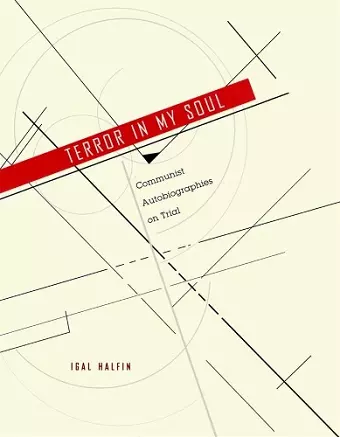Terror in My Soul
Communist Autobiographies on Trial
Format:Hardback
Publisher:Harvard University Press
Published:29th Aug '03
Currently unavailable, and unfortunately no date known when it will be back

What compounds the nightmares and killings of the twentieth century are the fervent hopes and strenuous activity of millions of ideological militants who fashioned their souls to be good Communists. In a brilliant argument, Igal Halfin explores the desire to become a Bolshevik and to remake the world, and unravels the ways in which Communists became complicit in their own undoing--and deaths--in the purges of the 1930s. This is a landmark study not only of the Bolshevik soul but of modern subjectivity. -- Peter Fritzsche, author of Germans into Nazis
Halfin exposes the inner struggles of Soviet Communists to identify themselves with the Bolshevik Party in the 1920s and 1930s. Combining the analysis of autobiography with the study of Communist psychology and sociology and the politics of Bolshevik self-fashioning, Halfin provides new insight into the preconditions of the Great Purge.
In this innovative and revelatory work, Igal Halfin exposes the inner struggles of Soviet Communists to identify themselves with the Bolshevik Party during the decisive decades of the 1920s and 1930s. The Bolsheviks preached the moral transformation of Russians into model Communists for their political and personal salvation. To screen the population for moral and political deviance, the Bolsheviks enlisted natural scientists, doctors, psychologists, sexologists, writers, and Party prophets to establish criteria for judging people. Self-inspection became a central Bolshevik practice. Communists were expected to write autobiographies in which they reconfigured their life experience in line with the demands of the Party.
Halfin traces the intellectual contortions of this project. Initially, the Party denounced deviant Communists, especially the Trotskyists, as degenerate, but innocuous, souls; but in a chilling turn in the mid-1930s, the Party came to demonize the unreformed as virulent, malicious counterrevolutionaries. The insistence that the good society could not triumph unless every wicked individual was destroyed led to the increasing condemnation of Party members as helplessly flawed.
Combining the analysis of autobiography with the study of Communist psychology and sociology and the politics of Bolshevik self-fashioning, Halfin gives us powerful new insight into the preconditions of the bloodbath that was the Great Purge.
Igal Halfin’s book examines the language and ritual of Russia’s communist party in the 1920s and 1930s. In particular, the author looks at party discourse and autobiography in order to shed light on the brutal dynamics of Joseph Stalin’s Great Purge… The book effectively broadens our understanding not only of the Communist Party but of revolutionary violence in Soviet Russia… His work instead highlights the importance of ideology…for its role in propelling the purges forward. Halfin’s study traces an essential shift in party narratives of the self from the 1920s to the 1930s, and his analysis of how party discourse contributed to Stalinist violence is compelling. The book identifies an important connection between language and terror in Communist Russia. -- Golfo Alexopoulous * American Historical Review *
What compounds the nightmares and killings of the twentieth century are the fervent hopes and strenuous activity of millions of ideological militants who fashioned their souls to be good Communists. In a brilliant argument, Igal Halfin explores the desire to become a Bolshevik and to remake the world, and unravels the ways in which Communists became complicit in their own undoing—and deaths—in the purges of the 1930s. This is a landmark study not only of the Bolshevik soul but of modern subjectivity. -- Peter Fritzsche, author of Germans into Nazis
- Nominated for Jacques Barzun Prize 2003
- Nominated for Wayne S. Vucinich Book Prize 2004
- Nominated for W. Bruce Lincoln Book Prize 2004
- Nominated for Allan Sharlin Memorial Award 2004
ISBN: 9780674010321
Dimensions: unknown
Weight: 653g
366 pages